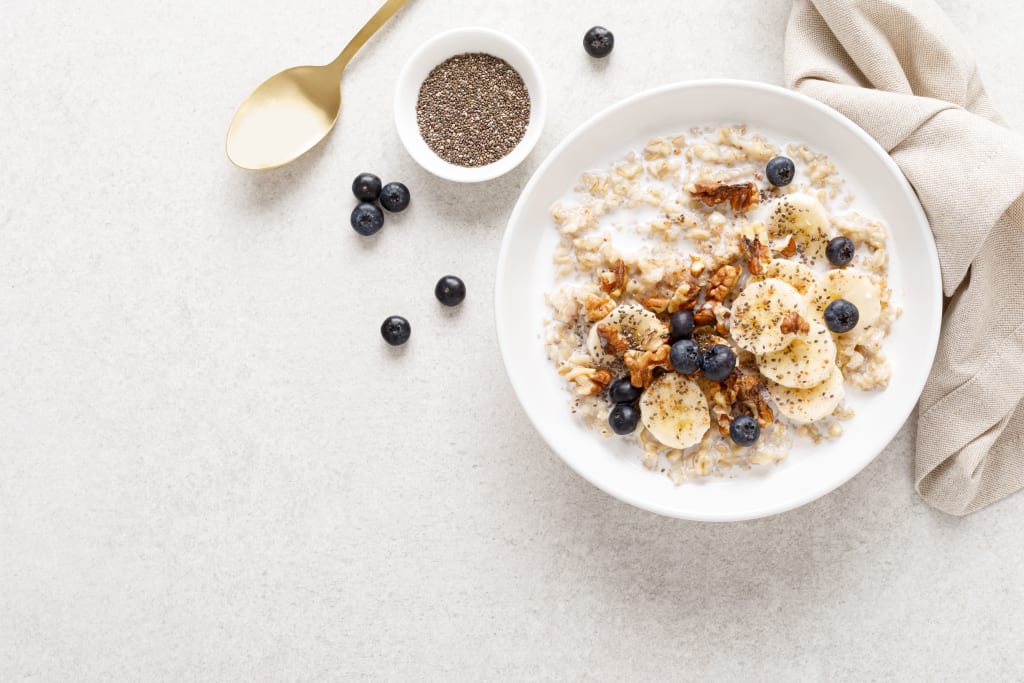Toilet Expert Reveals Why YOU Need To Start Eating More Fibre
Jordan Kelly, brand marketing manager for sustainable brand Oceans, has put together a helpful guide that outlines why you need to eat more fibre.

To underestimate the importance of fibre is to underestimate the importance of healthy bowels. Yes, we get it, talking about bowels and poop and toilets and toilet paper isn’t the most pleasant, but it’s crucial.
Looking after our gut is so incredibly important. In fact, did you know that 75 per cent of our immune system is in the stomach?
Incorporating more fibre into your diet is just one way to ensure that you’re encouraging healthy bowels.
Jordan Kelly, brand marketing manager for sustainable brand Oceans, has put together this helpful guide that outlines why you need to eat more fibre. It’s time to start giving a crap.
Understanding the importance of bowel health
It’s going to be a little difficult to move towards a high-fibre diet (and to stick to one) if you don’t first understand why it’s so crucial.
As most of us will know, our bodies require food for energy, growth, and repair. Once consumed, the digestive system converts the food we eat into its simplest forms.
Once broken down, the food is then absorbed into the bloodstream from the small intestine and the nutrients (such as carbohydrates and proteins) are carried to each cell in the body.
Are you still with us?
A large pool of microbes and bacteria lives within the large intestine and the wider digestive system. Believe it or not (but you should), it’s these bacteria that play a critical role in healthy digestion.
When your body doesn’t have enough good bacteria, the bad bacteria begin to thrive, and that’s when we might see various health conditions such as colitis (inflammation of the bowel), diverticulitis (inflammation of pouches lining the small intestine), and gastroenteritis (an infection that causes vomiting and diarrhoea).
What is fibre and why is it so important for healthy bowels?
Dietary fibre keeps your number twos in check, which is why healthcare professionals recommend you eat plenty of high-fibre foods each day.
The current recommendation is that adults should eat 30g of fibre per day, but why? What makes this type of carbohydrate so fantastic?
Well, dietary fibre increases the weight and size of our stool and softens it, which decreases the chance of constipation.
In a similar way, if you have diarrhoea (loose, watery stools), fibre has the power to help solidify the faeces because it absorbs water and adds bulk.
The benefits of a diet rich in fibre
This is your sign to start making a conscious effort to eat more fibre on a regular basis. Not just here and there, when you remember, or when you find something of relevance in the cupboard. We mean every day.
Currently, 20g a day is the average fibre intake for adults, so most of us have a long way to go to reach the recommended 30g.
But it’s worth the extra planning and consideration. The benefits of a fibre-rich diet include:
- Improved bowel movements – as discussed, fibre can both soften stool and increase stool bulk, depending on your needs. This makes bowel movements a lot easier.
- Weight loss – people who eat more fibre tend to have lower body weights than those with diets that lack fibre. This is thought to be because fibre increases feelings of fullness, so you naturally eat less food. Less food = less calories consumed throughout the day.
- Lowering cholesterol levels – soluble fibre binds cholesterol to the small intestine; once the fibre has attached to the cholesterol particles, it prevents them from entering your bloodstream. If you suffer from high cholesterol, this is just yet another reason to eat more fibre.
- Managing blood sugar levels – because fibre cannot be broken down into sugar molecules, it passes through the body undigested. As a result, it helps regulate sugar levels and, therefore, keeps your blood sugar in check.
Fibre-rich foods
So, now you know just how crucial fibre is in our diet, but how do you go about incorporating this goodness into your meals and snacks?
Here are some fibre-rich foods that need to go straight in your shopping trolley...
- Pears
- Strawberries
- Artichokes
- Avocados
- Oats
- Apples
- Raspberries
- Bananas
- Carrots
- Broccoli
- Brussel sprouts
- Lentils
- Kidney beans
- Split peas
- Chickpeas
- Popcorn
- Almonds
- Whole grains
- Quinoa
- Chia seeds
- Dark chocolate
- Sweet potatoes
- Whole-wheat pasta
By making a few simple switches, you could dramatically increase your fibre intake. For example, have only whole grains with your evening meal (brown rice, quinoa, dark rye bread); regularly enjoy fruit and porridge for breakfast; snack on nuts and seeds.
Not only are these tasty alternatives, but you’ll also critically improve your gut health. Everybody’s a winner.
Top tips for increasing fibre intake
This journey is a marathon, not a sprint. While you may better understand just how crucial fibre is for our well-being, it’s important you don’t try to do too much too soon.
Here are some top tips to help you not only incorporate more fibre into your diet but to ensure you stick to it, too.
- Take it slowly – don't race to reach 30g of fibre per day if you’re currently averaging nowhere near that amount. Instead, gradually increase your fibre intake to avoid digestive discomfort. You could start with snacks, then move to breakfast, then tackle lunch and dinner.
- Check the labels – on your next weekly food shop, make sure you read the labels to identify high-fibre products. For example, if you’re trying to choose between two of your favourite cereals, opt for the one that offers more fibre. Alternatively, use this as an opportunity to try new things!
- Meal planning – making changes to your diet can be overwhelming. To reduce the complexity, start planning your meals each week and noting down the fibre count of each. With something tangible in front of you, you’ll be able to monitor your intake and adjust where necessary.
Fibre is the way forward
It’s crucial you adopt healthy bowel habits for your overall well-being. It’s not just about managing your number twos, but managing your, well, everything!
75 per cent of your immune system is in your stomach, which should be the push you need to start consistently consuming more fibre-rich foods. Make a conscious effort to look after your bowel, and your bowel will look after you.





Comments
There are no comments for this story
Be the first to respond and start the conversation.